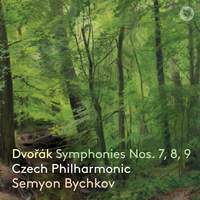Recording of the Week,
Dvořák Symphonies from the Czech Philharmonic and Semyon Bychkov
Currently in its sixth year, the partnership between the Czech Philharmonic and Chief Conductor Semyon Bychkov has been a fruitful one indeed, not least their recent recorded output on Pentatone which has so far seen the first few instalments in an ongoing cycle of Mahler symphonies, plus a captivating album earlier this year of Smetana's Má vlast. They now turn their attention to Dvořák's final three symphonies. So, how are the results?
Well, it's the Czech Philharmonic playing Dvořák, and is therefore entirely as magnificent as you might expect. To say that this orchestra (whose inaugural concert in January 1896 was conducted by none other than Dvořák himself in the very building where this album was recorded) understands this music so completely and innately can be nothing other than an enormous understatement.
I think the movement that best exemplifies the qualities that Bychkov and the orchestra bring to this music is the Scherzo of the Seventh Symphony: with just the right amount of rubato in the initial up-beat, there's charm and grace to the effortlessly floating strings, sprung and pointed wind and brass rhythms, and a laser-like precision with which the violins leap up to their high notes that is most impressive.
Do I have any slight quibbles? Well, if I were forced to do so, I might argue that for my own sensibilities the last movement of the Eighth Symphony is perhaps a smidgen too refined and polite, and I could occasionally have done with a bit more oomph (Bychkov doesn't allow his horns to be anywhere near as raucous as recordings by conductors such as István Kertész, Rafael Kubelík, or Colin Davis, for instance). But in any case that's all just a matter of taste, and is more than adequately offset by the many benefits that Bychkov's approach brings in terms of the clarity of textures and highly characterful woodwind playing (including some beautiful phrasing from the principal flute).
I have no such qualms about the horns elsewhere, with some pleasingly incisive moments throughout the Ninth Symphony and particularly third and fourth horns in their little solo that kicks of the Allegro molto section of the first movement, or the first and second horns in their flourish just before the final part of the last movement. There's also great tenderness in the famous cor anglais solo in the Largo, supported by sonorous strings who remain strikingly eloquent and impassioned even at the quietest of dynamics. For me the key to this depth of expression can be found most of all in the rich tone of instruments such as clarinets, bassoons and violas, which adds such warmth to the overall orchestral sound.
I must also make special mention of the percussion: Dvořák doesn't always give them a huge amount to do, but when he does Bychkov ensures that their contributions really count, from the triangle in the Scherzo of the Ninth to some engagingly exuberant cymbals and tambourine in the Carnival Overture, and crisp timpani with plenty of punch in the Othello Overture.
This set is a treasure trove of delights, underpinned by the expertise and assured sense of stylistic mastery that these players possess in this repertoire. I sincerely hope that this will not be the sole instalment in Bychkov's exploration of the composer's symphonies with his Czech orchestra.
Czech Philharmonic, Semyon Bychkov
Available Formats: 2 CDs, MP3, FLAC/ALAC/WAV, Hi-Res FLAC/ALAC/WAV




